The Adventures of Franco's Children
While the dictatorship has gone, Franco's descendants refuse to leave the stage.

Last week, a Galician court ruled that the Francos’ long-term summer residence, Pazo de Meirás, should pass into state ownership. The grand estate had been gifted to ‘the Founder of the New Empire, Head of State, Generalísimo of the Armies and Caudillo of Spain, Francisco Franco Bahamonde’ by a group of his supporters in 1938. Franco gratefully accepted it, before conducting a fake sale to himself in 1941 so that it was registered in his personal name, and not as a possession of the head of state. Franco’s descendants had held this up as evidence of ownership until recently when a group of lawyers discovered the original deed.
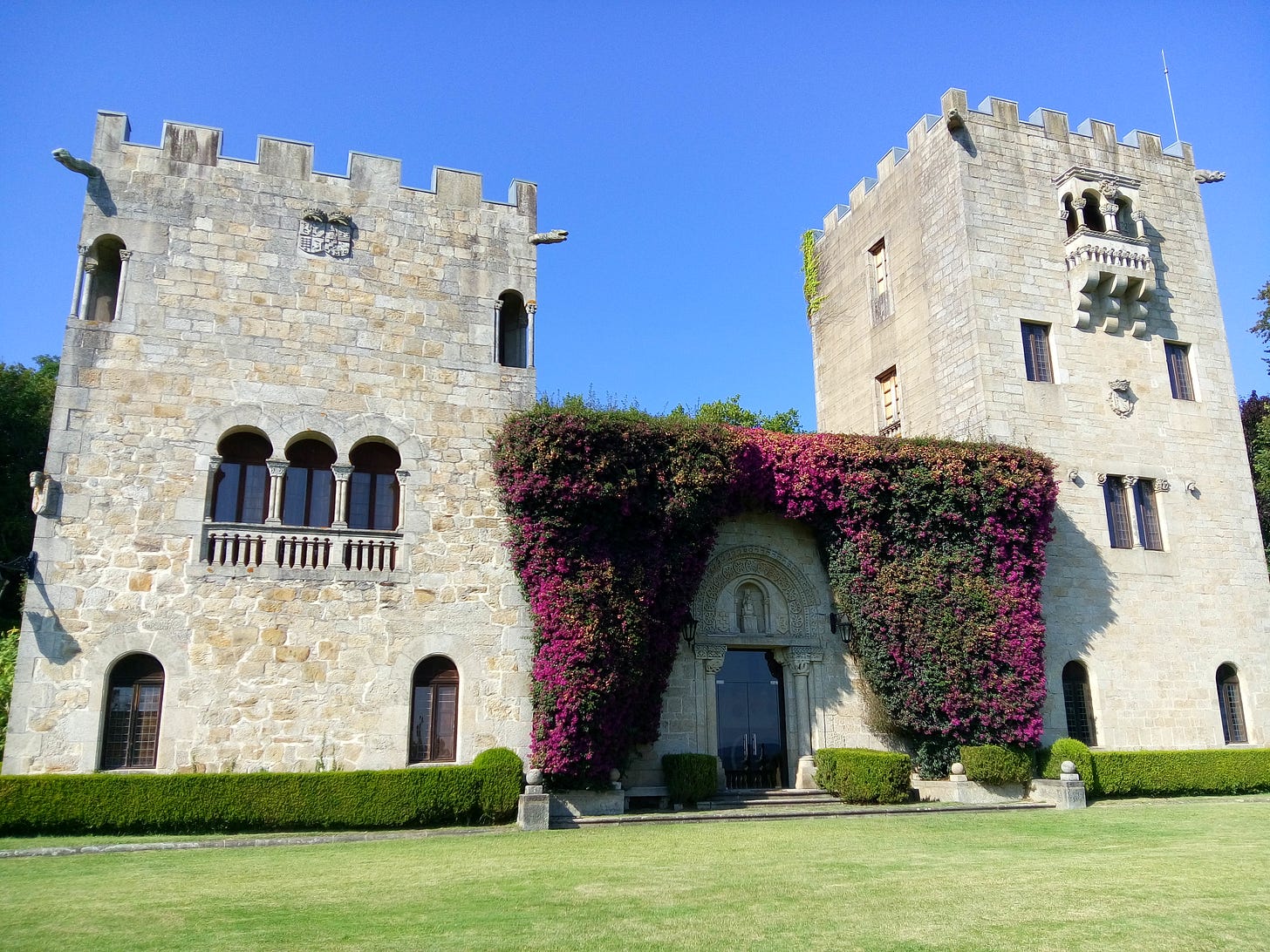
Normally when a dictatorship falls, the world watches as the once feared strongman is forced to flee his country or tried in court. After Spain’s dictatorship ended in 1975 with Franco’s death, there was no exile or trial. Instead, the new regime gave them money and titles. Spain dealt with them the same way it did with other leftovers of the dictatorship; with a benevolent forgetfulness. With the bigger prize of democracy within reach, treating the Francos with a combination of indulgence and ignorance was better than reopening old wounds and fighting old fights.
The architects of the transition to democracy have been proven correct in these actions. While on one hand, they installed the Francos as members of the aristocracy, on the other they also legalised the Socialist Party and Communist Party. Those parties are now in government together, and 45 years after Franco’s death Spain is still a mostly peaceful democracy.
But the Francos continue to hang around like a bad smell. Nowadays, their faces are mostly seen in the gutter press or police mugshots. But as their power and relevancy decay, they continue passing the family fortune down the generations.
Francisco Franco and his wife Carmen Polo had one child - Carmen Franco. She was born in 1926 while her father was still a general in the army. In 1950, with her father now head of state and living in the El Pardo palace, she married an aristocrat, Cristóbal Martínez-Bordiú. When her father died and his chosen successor Juan Carlos I became king, she became the 1st Duchess of Franco, courtesy of the new king.
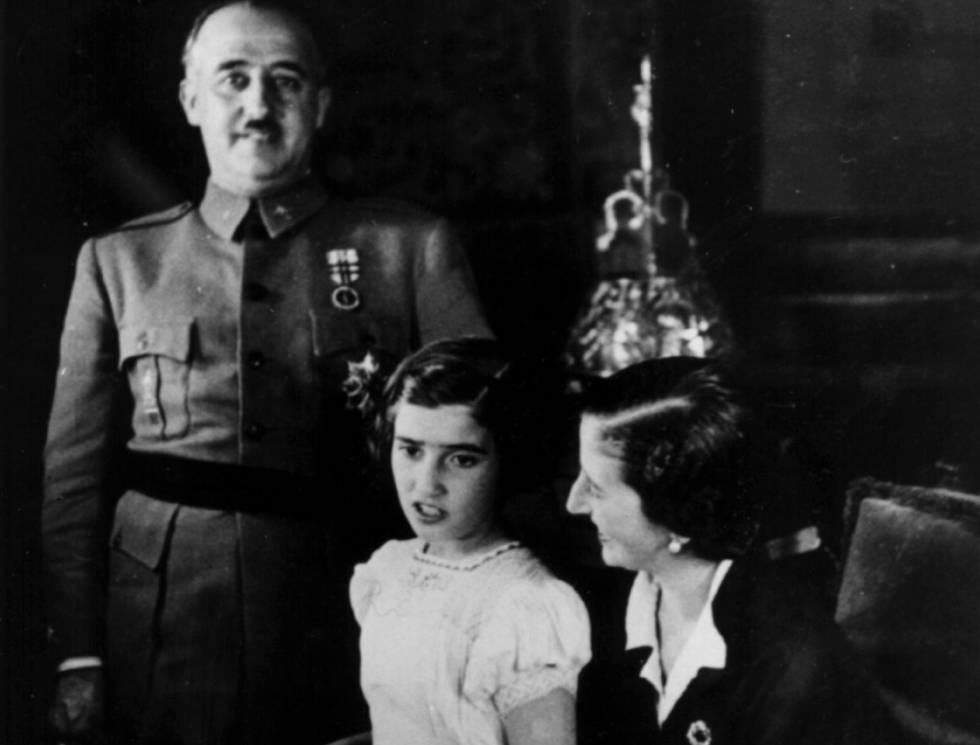
Above: The Francos with their daughter Carmen
So lenient was Spain’s democratic government towards the Francos that members of the family were provided with diplomatic passports right up until the end of the 80s. One day in 1978, the Duchess, with her special passport, was on her way to Switzerland from Madrid Barajas airport when the metal detector picked up something in her bag. A search revealed the bag to be full of medals and ornaments carved from precious metals - objects her father had received as gifts in his capacity as head of state. It didn’t take much to work out what she intended to do with them once she got to Switzerland, and she was charged with smuggling.
The Francos have a history of confusing diplomatic gifts for personal ones. During the dictatorship, the Francos held numerous parties in their state residence in El Pardo, pulling in gifts from individuals and institutions. They were never officially documented, and instead of giving them to Spain Franco’s descendants have kept them for themselves or sold them. Carmen Polo, the dictator’s wife, had Spain’s share of the Apollo 11 moon rocks - gifted to Spain and 135 other countries by the USA - sitting on the family mantlepiece for years, before handing them down to her daughter. She lost them while moving house, after allegedly trying to sell them at auction. They’ve never been found.
More seriously for those who want to know what really went on during the Franco years, the family also kept hold of many government documents. They’re now under the lock and key of the Francisco Franco National Foundation, a private organisation which promotes a revisionist version of the dictatorship and was chaired for a number of years by the 1st Duchess of Franco herself. This is akin to the idea of Donald Trump’s offspring keeping all his presidential documents from his years in the White House and refusing to release them to the public or even to the next government.
The first daughter of Carmen Franco, and first grandchild of Franco, was also called Carmen. Spain has come to refer to her as la nietísima, ‘the special granddaughter’. The majority of Franco’s descendants have, for all their failings, always sought to live private lives and have only been prevented from doing so by the press. Not so with Carmen, who has carved a celebrity career out of being Franco’s granddaughter; appearing on Spain’s version of Strictly Come Dancing and happily flitting in and out of the celebrity magazines.
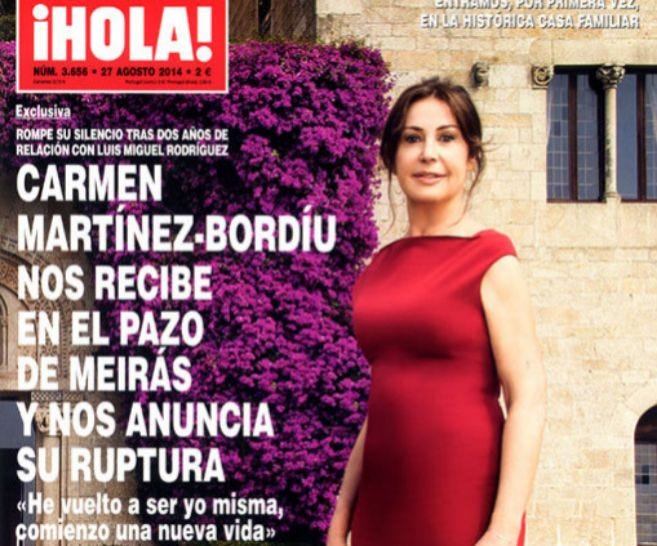
Above: La Nietísima in the news again, announcing a breakup outside Pazo de Meirás
It was Carmen Martínez-Bordiú who tied the Franco family to royalty by marrying Prince Alfonso de Borbón, King Juan Carlos I’s cousin. She later admitted she only did this to get out of the house, the intensity of El Pardo having become stifling. The marriage lasted 10 years, during which Carmen had two children. The first, Francisco, was killed when his father crashed the car after ignoring a stop sign in Navarra. Alfonso never recovered from the grief. He himself died before his time in a skiing accident in Colorado, USA, in 1989.
Carmen’s second son, Luis Alfonso, is, since his father’s death, the head of the House of Bourbon - of which Spain’s royal family is a part. Had his paternal grandfather Infante Jaime not renounced his claim to the throne, he would now be king of Spain. His great-grandfather was the last of Spain’s pre-war kings, Alfonso XIII.
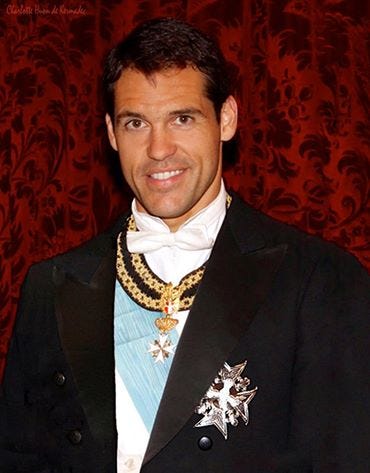
Above: Luis Alfonso, aspirant king
Luis Alfonso is also a pretender to the defunct French throne, having inherited the claim through Louis XIV of France’s grandson, Felipe V of Spain. He also claims to be the Duke of Anjou, although the dukedom is in France, where dukes haven’t been recognised for a long time. Regardless, he likes the title and attracted controversy when he sent out wedding invitations bearing it when he married his wife, a Venezuelan heiress. Apparently, he still has ideas on the French throne, should a second Bourbon restoration ever come about - something which looks ridiculous to anyone outside the Franco family.
Crown or no crown, it pays to be a pretender to the French throne and call yourself a duke. In 2019, it came to light that Luis Alfonso, who has a banking career with the Venezuelan bank owned by his father-in-law, had allegedly allowed his ‘title’ to be used to attract depositors. One Venezuelan woman, who had sold her house in preparation to flee her stricken country and start a new life in Spain, deposited $370,000 in the bank.
‘We did it because of the guarantees they gave us that there was a nobleman in charge, someone very well-known - a prince - someone who appeared in the magazines. They promised us 6% interest. I have read that this gentleman, the Bourbon, is running for the throne of France,’ she related from Caracas.
The money disappeared. The bank, having assured the client of its safety as custodian of her life savings, had gone under. The Panamanian and Curaçao governments intervened to protect their citizens, but the Venezuelan woman was left high and dry, and accused the prince of being a scammer. So next time you receive a suspicious email regarding money from someone claiming to be a foreign prince, consider that it may be from the Duke of Anjou, Luis Alfonso de Borbón, pretender to the French throne; almost a real prince.
Other Francos haven’t faired so well - Jaime Martínez-Bordiú, la nietisima’s little brother, is best known for his brushes with the law. In 2009, Jaime, who has long suffered from cocaine addiction, spent a year in prison for abusing his ex. Another run-in with the law came about after a bizarre altercation on a Madrid street in which he allegedly threatened another driver with an antique revolver. According to the other driver, Jaime crashed into his car, refused to give insurance information and then drew the revolver, firing four shots into the air. The police later searched his car and found no evidence.
The Francos are an odd bunch. They resemble the powerful families of fiction; the eccentric Buendía family from One Hundred Years of Solitude, or the once-powerful and dysfunctional Vangers of The Girl With The Dragon Tattoo.
Recently the Spanish government has started to treat the Francos with a little less indulgence. Last year, the Socialist government of Pedro Sanchez won a court battle against the Franco family to move the dictator’s remains from his grand mausoleum at the Valley of the Fallen. The monument, Franco claimed, commemorated all the victims of the civil war, on both sides. But it was built by political prisoners, and the only names it bears are those of Franco and Jose Antonio Primo de Rivera, the founder of the fascist Falange movement. Spain had a rare sighting of the remaining Francos together once more as they carried the dictators remains from the basilica.
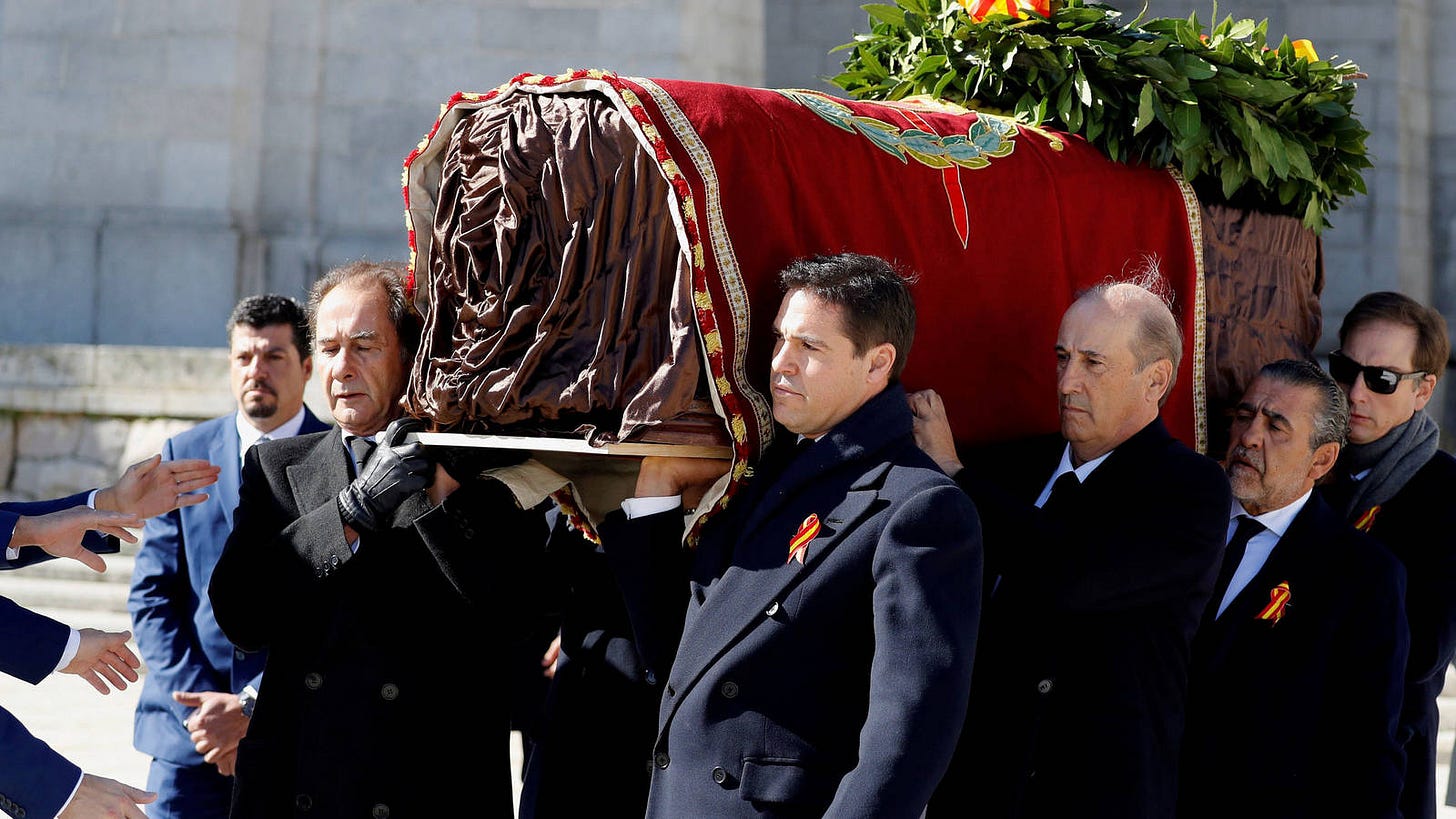
Above: The Francos carry the dictator’s exhumed remains from the basilica
The Galician judge last week ruled that the 1941 sale of the Pazo was ‘fictional’ - legally, it never happened. No doubt the Francos will appeal that decision, as their privileged lives hang on another fiction; that of their superiority over other Spaniards. They still desperately cling to what their grandparents stole from the Spanish people during and after the civil war. It is heartening to see the Spanish state have the confidence to take them on, and another sign of the fascinating times we are living through in Spain.
Thanks for reading today! I love hearing from people with recommendations or requests for things I could write about, so feel free to reply to this email! You can also follow me on Twitter.




